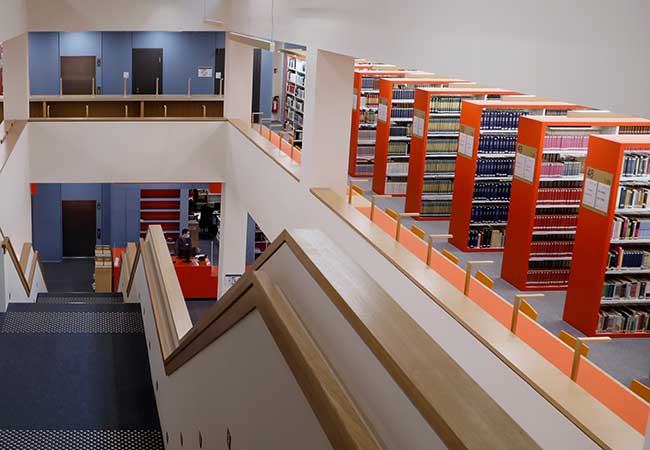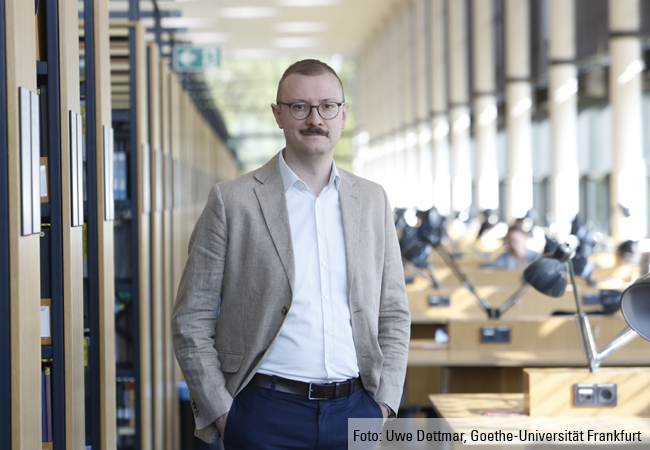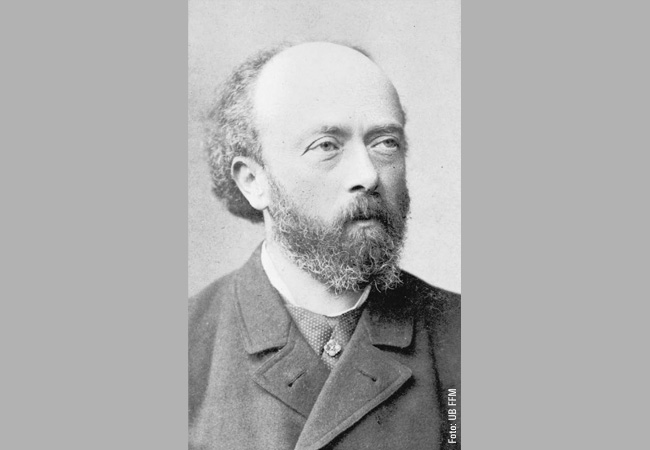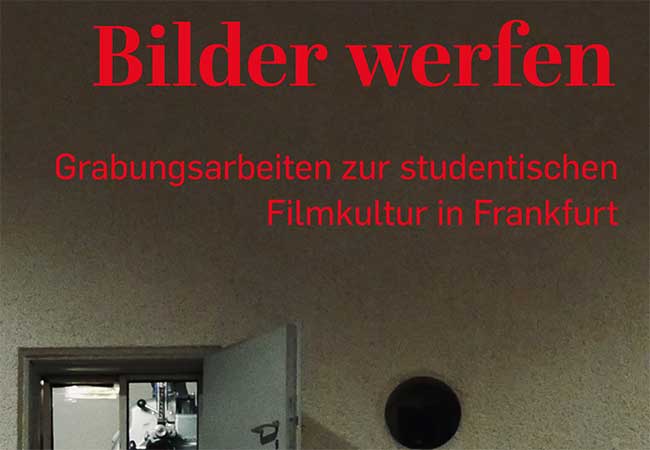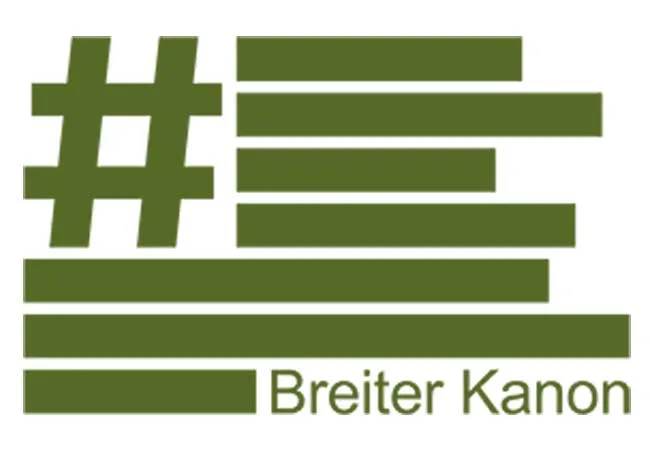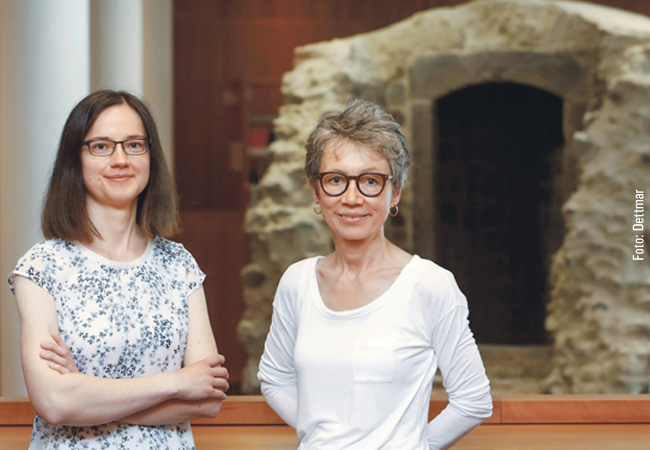It was a great moment for the development of the Westend Campus when, on September 28, the new building for Linguistics, Cultures and Arts was ceremonially inaugurated in the presence Michael Boddenberg, finance minister of the federal state of Hesse, Ayse Asar, Hesse’s state secretary for the sciences, and Goethe University President Prof. Enrico Schleiff. It also constituted a big step for the University Library (UB JCS), seeing that it completes the concept of six departmental libraries surrounding a central one, which dates back 20 years to then-library director Berndt Dugall and erstwhile University President Prof. Rudolf Steinberg. The sixth of its kind, the new BSKW departmental library of the UB JCS serves the subject areas of linguistics and cultural studies. Making it a reality required not only a complex move from the Bockenheim Campus to the Westend Campus, but also the consolidation of twelve departmental libraries.
UniReport talked about the significance of the BSKW library to Dr. Angela Hausinger, University Library (UB JCS) deputy director, and Christiane Schaper, acting director of the BSKW (and head of the Humanities Library, BzG).
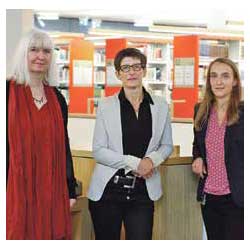
UniReport: Dr. Hausinger, Ms. Schaper, when it comes to the BSKW, we are not just talking about a move into a new university building, but about a completely new library. Did and does that constitute a dual challenge in terms of planning and logistics?
Angela Hausinger: The twelve departmental libraries had very different structures and equipment in place. Whereas the Art, Islamic and Asian Libraries were already administered by the central University Library, some departmental libraries were run solely by student assistants, without any library support. To prepare for the move, all inventory had to be surveyed and a decision made on what would go into the open-access area, into storage, or handed over to the central library. Doing so kept us very busy in the last two years, with Christiane Schaper joining as project manager in the summer of 2021. I for my part focused on supporting the architectural phase from the users’ point of view.
Christiane Schaper: The Library Center for the Humanities (BzG), which I have managed since 2005, also had to cope with the dual task of reorganization and relocation. In 2001, a new organizational unit was created, combining more than 20 institute libraries into a joint departmental library. The same happened now at the BSKW, although the departmental libraries’ initial points of departure were quite different.
Is that why a lot of work had to be done ahead of the move?
Schaper: The goal was clear from the outset: to round out the humanities field by merging the departmental libraries; that is, to bring together all the humanities subjects that previously had not been housed in a divisional library into the available space, and to operate them as a joint library through the UB JCS. This relocation goes hand in hand with greater accessibility and usability, for example through extended opening hours and a contemporary range of services for all usages, including group study rooms, a modern loan booking system, and registration in the UB JCS common catalog. Implementation required a lot of preparatory work – both in terms of the data that had to be recorded for the catalog, as well as organizationally. It was a challenge managing both at the same time: Preparing for a move – which took up a lot of our time in recent months – and simultaneously getting ready for library operations. Anyone working in this field can attest to that.
Hausinger: The departmental library concept is not new; it is used in all departmental libraries, and based on a lot of open-access holdings, few materials in storage, no additional room to grow. In essence, what we are talking about is a self-renewing library. This means when something comes in here, something else has to go or be handed over to the central library, which also has an archiving function. If you look around the BSKW, you can see that there are no meters of empty shelves. On the contrary, we’re already filled to the brim (laughs).
So you didn’t know exactly beforehand what books were available in each institute’s library?
Schaper: It depended. While the recording in the Art Library, which has been operating as a UB JCS department for a long time, was already very good, there were still large volumes of unrecorded volumes in Islamic Studies, for example.
Hausinger: Our starting points ranged from Excel spreadsheets to homegrown databases to high-quality catalog data already recorded in our library system.
Does the new library mean the institutes have to relinquish some of their former control? How is this received?
Schaper: Generally speaking, it should come as a relief when you as an institute no longer have to take care of a functioning library. That is now the job of the UB JCS specialists. However, merging a small unit into a larger one also means universal regulations take effect, ensuring that the conditions for use are the same for everyone. Individual regulations, many of which were appreciated by institute members – not least because of the immediate access – will no longer apply. This is something people will have to get used to, and there may well be a certain amount of parting pains. But we are confident that in the end, the advantages will outweigh the disadvantages.
Hausinger: The library is now equally accessible to everyone at much more generous opening hours.
What in your mind sets the BSKW library apart?
Hausinger: Looking at the color scheme, it is definitely our most colorful library. Many smaller disciplines are housed here, requiring a lot of maintenance. Librarians need special skills – after all, if you’re working on Sinology inventory, for example, you have to know Chinese. The same applies to musicology and sheet music. That is definitely a special feature of the BSKW. Of course, we have to ensure a certain balance. It simply isn’t possible to employ an appropriately trained specialist for every language. When it comes to outstanding characteristics, I would also like to point out the high quality of staying at the library, with its quiet individual workstations, armchairs for relaxation, and common study rooms. The BSKW library’s self-image is that of a place of communication where users of different subjects come together.
Libraries are increasingly popular, especially among students, as places to work and communicate. Was this change in usage considered, also with regard to digitization?
Hausinger: The Bologna Process certainly had an influence, resulting in greater demand for common study rooms. While this was not yet accommodated in the BzG in 2001, it did play a much bigger role in the Law and Economics Library as well as all the departmental libraries that followed. At BSKW, we intend to focus even more strongly on the interface with the central library. In addition, we want to promote close cooperation with department specialists, so that in future there will also be consulting services on digital humanities and research data management. Generally speaking, electronic media are becoming increasingly important in the humanities. That said, a library’s function is no longer limited to housing books that can be borrowed. We offer a wide range of services, from research data management to publication support, open access promotion all the way to long-term availability.
Schaper: I would like to emphasize one more thing: Even the most beautiful library is of no use if you don’t have people who keep on pushing and work well together. I think here at the new BSKW both works very well. A newly formed team – under the helm of new BSKW director Dr. Aïsha Othman – staffed with employees who bring in very different experiences and competencies: That is what a library thrives on!
Hausinger: I would like to add that even the most beautiful library is of no use if it isn’t filled with life. That’s why I’m hoping for many users, who will learn, do research and just feel comfortable.
BSKW Facts and Figures
What moved in?
12 departmental libraries of Faculty 9 • African Studies • Empirical Linguistics • Islamic Studies • Japanese Studies • Jewish Studies • Korea Studies • Art Library/Städel Library • Art Education • Musicology • Phonetics • Sinology • Southeast Asian Studies
Workplaces for users
350 work places • 257 individual reading places • 6 reservable common work rooms
Inventory and Move
Room for 385,000 books, about 100,000 of them in storage • Equivalent to 14 consecutive kilometers of shelves, 10.8 km of which are open-access, and 3.2 km in storage • Moving period: August 22 to September 22, 2022 • all told, 14.85 km of inventory (incl. donations to the central library) were moved
BSKW Staff
Equivalent of 17 full-time library staff (most working part-time) • Supported by student assistants
BSKW Opening Times
Mon to Fri 08.00 to 20.00
Sat 10.00 to 18.00
BSKW Learning Center
Mon to Fri 20.00 to 22.00
Sat 18.00 to 22.00
BSKW Website: www.ub.uni-frankfurt.de/bskw


